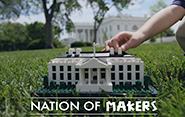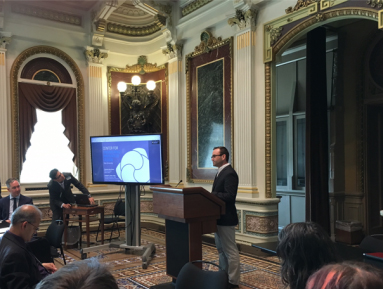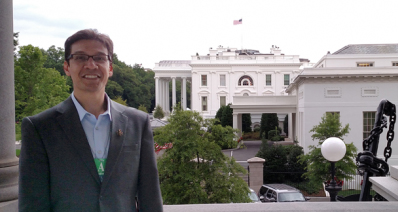Zinter And Kwan Talk CEID Success at White House Symposium

As part of the National Week of Making, two SEAS representatives took part in a White House symposium, where they shared their thoughts on what makes a successful makerspace.
 |
| Dr. Joseph Zinter, assistant director of the Center for Engineering Innovation & Design |
Dr. Joseph Zinter, assistant director of the Center for Engineering Innovation & Design (CEID), and Thomas Kwan, a fellow of the Advanced Graduate Leadership Program, were invited to the symposium. It was organized by the White House Office of Science and Technology Policy, and the MakeSchools Alliance, an organization of universities with makerspaces.
"It was a meeting of academics and government officials to discuss the value of academic makerspaces," Zinter said. "We provided an overview of the CEID and shared some best practices in running a successful space."
Zinter and Kwan focused on three key elements to the CEID's success:
Inclusion: "That means having our space open to all disciplines of engineering, the social sciences and humanities, undergrads graduate students, professionals," Kwan said. "Everybody here on campus can become a member of the space.
Space: Not only is the CEID's space functional, it's designed to be welcoming – even to people who may not immediately identify themselves as "makers" or have an engineering background.
Balance: The programming, activities and management of the CEID are designed to strike a balance among all skill levels of making, and to appeal to a broad spectrum of the Yale community.
The event was called as part of the National Week of Making, which began June 17 with an announcement from Pres. Barack Obama, and ended June 23. Pres. Obama called the week a celebration of "the tinkerers and dreamers whose talent and drive have brought new ideas to life."
Although Yale has long been a leader among universities in the maker movement, Zinter and Kwan said it was exciting to hear what other schools were doing.
"Without a doubt, 'making' and 'micro-manufacturing' is disruptive and the movement has the potential to positively change the way educators and students interact. Universities across the nation are investing in maker spaces," Kwan said. "How that's defined varies for each university. For us, it's a consolidated space where we have a variety of programming for novice to expert makers, as well as formal classes. It's visible to the public and students; but most importantly, the culture of our space is a hub for inclusion and creativity."
|
Thomas Kwan, Advanced Graduate Leadership Program Fellow |


